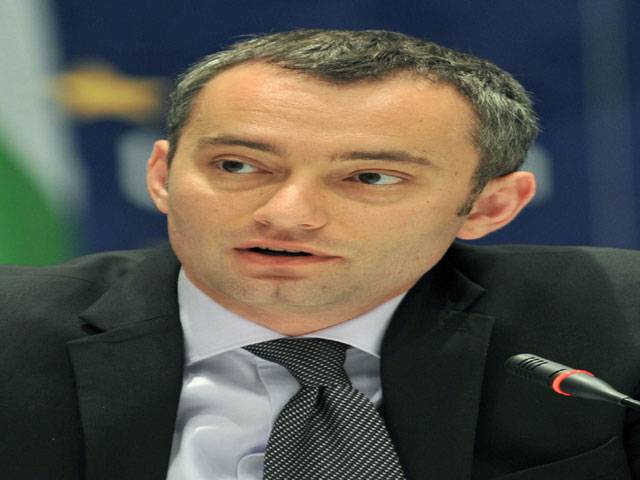BAGHDAD : A suicide bomber killed six army recruits Wednesday as the UN’s envoy to Iraq warned that the country’s election campaign would be “highly divisive” amid a year-long surge in bloodshed. The attack came on the second day of campaigning for April 30 parliamentary polls, Iraq’s first since March 2010.
UN special envoy Nickolay Mladenov, in an interview with AFP, underscored fears the polls could worsen a long-standing political deadlock in which Iraq’s fractious national unity government has passed little in the way of significant legislation.
Wednesday morning, a suicide bomber blew himself up at the entrance to an army recruitment centre in northern Iraq, killing six would-be soldiers and wounding 14 others, a general and a doctor said.
The attack in Riyadh, a mostly-Sunni town in ethnically mixed Kirkuk province, comes with the country suffering near-daily violence, part of a long list of voter complaints that include lengthy power cuts and poor running water and sewerage services, rampant corruption and high unemployment.
But campaigns are rarely fought on individual issues, with parties instead appealing to voters’ ethnic, sectarian or tribal allegiances or resorting to trumpeting well-known personalities.
A lack of effort at cross-sectarian politics could, Mladenov said, be a major issue. “Campaigning will be highly divisive,” he told AFP from his office in Baghdad’s heavily fortified Green Zone complex. “Everyone is ratcheting it up to the maximum, and you could see this even before officially the campaign started.”
The former Bulgarian foreign and defence minister added: “I would hope that it would be more about issues, and how the country deals with its challenges, but at this point, it’s a lot about personality attacks.” “The efforts to reach across the sectarian divide are very weak.”
He declined to name specific offenders, instead blaming “all the political parties” for the rhetoric.
The sharp rise in violence over the past year has fuelled fears Iraq is slipping back into the sort of all-out communal conflict that killed tens of thousands in 2006 and 2007.
UN figures released Tuesday put the toll for March at 592 dead. That did not include the conflict-hit desert province of Anbar, where militants have kept control of the town of Fallujah, a short drive from Baghdad, for nearly three months.
Mladenov also pushed for lawmakers to urgently pass the annual budget, which has languished in parliament over an energy dispute between the central government and the autonomous Kurdish region.
“I think the window closes in about two weeks,” Mladenov said of budget negotiations, because any longer would risk turning the spending bill into an election issue, likely further complicating the talks.
He continued: “It’s a concern that if you wait for the deal after the elections, that deal, whatever the results of the election, will be delayed, and inevitably made more difficult.”
Asked what the impact would be if the budget were further delayed, or not agreed this year, he replied: “It’s bad for the business climate, it’s unpredictable, it puts projects on hold. So, from an investment perspective, you plan to do certain things and now you can’t pay for them.”
“It’s also bad from an accountability perspective.”
The tensions between Baghdad and Kurdish authorities in the northern city of Arbil have long been cited as among the biggest threats to long-term stability.
Along with the dispute over oil exports, Arbil wants to incorporate a vast swathe of territory stretching from Iran to Syria into its three-province autonomous region over the central government’s objections.
Friday, April 19, 2024
Iraq suicide bomb kills 6 as UN warns of ‘divisive’ polls

Caption: Iraq suicide bomb kills 6 as UN warns of ‘divisive’ polls
8:27 AM | April 19, 2024
8:09 AM | April 19, 2024
Church leader calls for including Christians in Gandhara Corridor
8:50 PM | April 19, 2024
Empowering Women: The Vision of Maryam Nawaz Sharif
8:37 PM | April 19, 2024
President Zardari confers Nishan-i-Imtiaz (M) award on Turkish CGS
8:23 PM | April 19, 2024
NA speaker suspends two MNAs for disruptive behavior during presidential address
8:20 PM | April 19, 2024
PM Shehbaz orders accelerating countrywide drive against smuggling
8:19 PM | April 19, 2024
A Tense Neighbourhood
April 19, 2024
Dubai Underwater
April 19, 2024
X Debate Continues
April 19, 2024
Hepatitis Challenge
April 18, 2024
IMF Predictions
April 18, 2024
Kite tragedy
April 19, 2024
Discipline dilemma
April 19, 2024
Urgent plea
April 19, 2024
Justice denied
April 18, 2024
AI dilemmas unveiled
April 18, 2024
ePaper - Nawaiwaqt
Advertisement
Nawaiwaqt Group | Copyright © 2024





